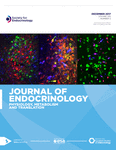Testosterone: a vascular hormone in health and disease
- 1Department of Human Metabolism, Medical School, The University of Sheffield, Sheffield S10 2RX, UK
2Robert Hague Centre for Diabetes and Endocrinology, Barnsley Hospital NHS Foundation Trust, Gawber Road, Barnsley S75 2EP, UK
- (Correspondence should be addressed to T H Jones; Email: hugh.jones{at}nhs.net)
Abstract
Coronary heart disease is a leading cause of premature death in men. Epidemiological studies have shown a high prevalence of low serum testosterone levels in men with cardiovascular disease (CVD). Furthermore, a low testosterone level is associated in some but not in all observational studies with an increase in cardiovascular events and mortality. Testosterone has beneficial effects on several cardiovascular risk factors, which include cholesterol, endothelial dysfunction and inflammation: key mediators of atherosclerosis. A bidirectional relationship between low endogenous testosterone levels and concurrent illness complicates attempts to validate causality in this association and potential mechanistic actions are complex. Testosterone is a vasoactive hormone that predominantly has vasodilatory actions on several vascular beds, although some studies have reported conflicting effects. In clinical studies, acute and chronic testosterone administration increases coronary artery diameter and flow, improves cardiac ischaemia and symptoms in men with chronic stable angina and reduces peripheral vascular resistance in chronic heart failure. Although the mechanism of the action of testosterone on vascular tone in vivo is not understood, laboratory research has found that testosterone is an L-calcium channel blocker and induces potassium channel activation in vascular smooth muscle cells. Animal studies have consistently demonstrated that testosterone is atheroprotective, whereas testosterone deficiency promotes the early stages of atherogenesis. The translational effects of testosterone between in vitro animal and human studies, some of which have conflicting effects, will be discussed in this review. We review the evidence for a role of testosterone in vascular health, its therapeutic potential and safety in hypogonadal men with CVD, and some of the possible underlying mechanisms.
- Received in final form 25 March 2013
- Accepted 2 April 2013
- Made available online as an Accepted Preprint 2 April 2013
- © 2013 Society for Endocrinology











